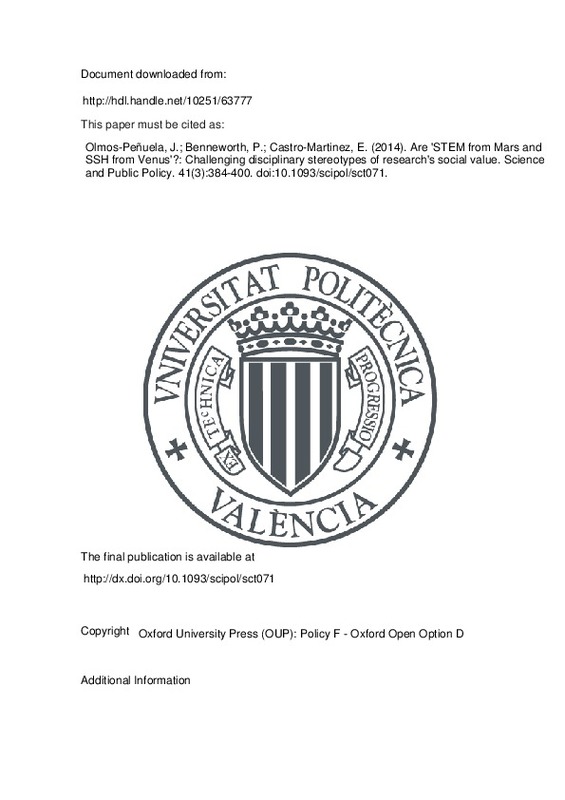Abreu, M., & Grinevich, V. (2013). The nature of academic entrepreneurship in the UK: Widening the focus on entrepreneurial activities. Research Policy, 42(2), 408-422. doi:10.1016/j.respol.2012.10.005
Alrøe, H. F., & Kristensen, E. S. (2002). Agriculture and Human Values, 19(1), 3-23. doi:10.1023/a:1015040009300
Azagra-Caro, J. M. (2007). What type of faculty member interacts with what type of firm? Some reasons for the delocalisation of university–industry interaction. Technovation, 27(11), 704-715. doi:10.1016/j.technovation.2007.05.003
[+]
Abreu, M., & Grinevich, V. (2013). The nature of academic entrepreneurship in the UK: Widening the focus on entrepreneurial activities. Research Policy, 42(2), 408-422. doi:10.1016/j.respol.2012.10.005
Alrøe, H. F., & Kristensen, E. S. (2002). Agriculture and Human Values, 19(1), 3-23. doi:10.1023/a:1015040009300
Azagra-Caro, J. M. (2007). What type of faculty member interacts with what type of firm? Some reasons for the delocalisation of university–industry interaction. Technovation, 27(11), 704-715. doi:10.1016/j.technovation.2007.05.003
Bonaccorsi, A., & Piccaluga, A. (1994). A theoretical framework for the evaluation of university-industry relationships. R&D Management, 24(3), 229-247. doi:10.1111/j.1467-9310.1994.tb00876.x
Bullen *, E., Robb, S., & Kenway, J. (2004). ‘Creative destruction’: knowledge economy policy and the future of the arts and humanities in the academy1. Journal of Education Policy, 19(1), 3-22. doi:10.1080/0268093042000182609
Cohen, W. M., Nelson, R. R., & Walsh, J. P. (2002). Links and Impacts: The Influence of Public Research on Industrial R&D. Management Science, 48(1), 1-23. doi:10.1287/mnsc.48.1.1.14273
D’Este, P., & Patel, P. (2007). University–industry linkages in the UK: What are the factors underlying the variety of interactions with industry? Research Policy, 36(9), 1295-1313. doi:10.1016/j.respol.2007.05.002
Donovan, C. (2005). The Governance of Social Science and Everyday Epistemology. Public Administration, 83(3), 597-615. doi:10.1111/j.0033-3298.2005.00464.x
Edgar, A., & Pattison, S. (2006). Need humanities be so useless? Justifying the place and role of humanities as a critical resource for performance and practice. Medical Humanities, 32(2), 92-98. doi:10.1136/jmh.2006.000226
Geuna, A., & Muscio, A. (2009). The Governance of University Knowledge Transfer: A Critical Review of the Literature. Minerva, 47(1), 93-114. doi:10.1007/s11024-009-9118-2
Gulbrandsen, M., & Kyvik, S. (2010). Are the concepts basic research, applied research and experimental development still useful? An empirical investigation among Norwegian academics. Science and Public Policy, 37(5), 343-353. doi:10.3152/030234210x501171
Hessels, L. K., van Lente, H., & Smits, R. (2009). In search of relevance: the changing contract between science and society. Science and Public Policy, 36(5), 387-401. doi:10.3152/030234209x442034
Jaaniste, L. (2009). Placing the creative sector within innovation: The full gamut. Innovation, 11(2), 215-229. doi:10.5172/impp.11.2.215
Kaiser, R., & Prange-Gstöhl, H. (2010). A paradigm shift in European R&D policy? The EU Budget Review and the economic crisis. Science and Public Policy, 37(4), 253-265. doi:10.3152/030234210x496655
Kyvik, S. (1994). Popular science publishing. Scientometrics, 31(2), 143-153. doi:10.1007/bf02018557
Kyvik, S. (2005). Popular Science Publishing and Contributions to Public Discourse among University Faculty. Science Communication, 26(3), 288-311. doi:10.1177/1075547004273022
Leisyte, L., & Horta, H. (2011). Introduction to a special issue: Academic knowledge production, diffusion and commercialization: policies, practices and perspectives. Science and Public Policy, 38(6), 422-424. doi:10.3152/030234211x12960315267697
Molas-Gallart, J., & Tang, P. (2011). Tracing «productive interactions» to identify social impacts: an example from the social sciences. Research Evaluation, 20(3), 219-226. doi:10.3152/095820211x12941371876706
Nightingale, P., & Scott, A. (2007). Peer review and the relevance gap: ten suggestions for policy-makers. Science and Public Policy, 34(8), 543-553. doi:10.3152/030234207x254396
Pavitt, K. (1991). What makes basic research economically useful? Research Policy, 20(2), 109-119. doi:10.1016/0048-7333(91)90074-z
Perkmann, M., & Walsh, K. (2007). University–industry relationships and open innovation: Towards a research agenda. International Journal of Management Reviews, 9(4), 259-280. doi:10.1111/j.1468-2370.2007.00225.x
Pilegaard, M., Moroz, P. W., & Neergaard, H. (2010). An Auto-Ethnographic Perspective on Academic Entrepreneurship: Implications for Research in the Social Sciences and Humanities. Academy of Management Perspectives, 24(1), 46-61. doi:10.5465/amp.2010.50304416
Schartinger, D., Rammer, C., Fischer, M. M., & Fröhlich, J. (2002). Knowledge interactions between universities and industry in Austria: sectoral patterns and determinants. Research Policy, 31(3), 303-328. doi:10.1016/s0048-7333(01)00111-1
Spaapen, J., & van Drooge, L. (2011). Introducing «productive interactions» in social impact assessment. Research Evaluation, 20(3), 211-218. doi:10.3152/095820211x12941371876742
Van Langenhove, L. (2012). Make social sciences relevant. Nature, 484(7395), 442-442. doi:10.1038/484442a
[-]







![[Cerrado]](/themes/UPV/images/candado.png)


